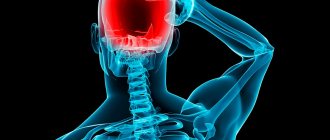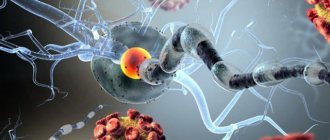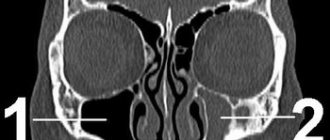If a person has an obsessive concern about his own health, he begins to look for (and finds!) various diseases, although in reality there are no prerequisites for this, then doctors talk about hypochondria. Not only do such people convince themselves of the presence of some disease, they manage to make even the attending physician believe it. This problem requires the unconditional intervention of a specialist.
At CELT you can get advice from a psychiatrist.
- Appointment with a psychiatrist with an extended interview, psychotherapy session - 4,700
Make an appointment
general information
Hypochondriacal neurosis is a person’s inadequate attitude towards his body and is a psychological disorder.
The disease can develop against the background of any somatic pathologies and emerging negative thoughts. This is the type of neurosis when a person begins to especially attribute non-existent diseases to himself and is anxious about his well-being. The group includes teenage children and the elderly. Women suffer from this disease much more often than men, so you need to urgently contact a specialist to get the necessary help.
Types of senestopathy
It is customary to distinguish several types of senestopathy, which are most often diagnosed in patients.
Senesthopathy syndrome
A painful sensation that can spread to different parts of the body. It can take different forms:
- pressing
- Burning
- Pulling
- Rolling
- contracting
- Boring
- Tearing.
They differ from ordinary pain sensations because they do not have a clear localization. It is important to note that the disease has no clear age boundaries and develops regardless of gender.
Senesthopathy with neurosis
With neurosis, pain occurs quite rarely. Some of the most common symptoms include the following:
- Apparent lesion of a certain area, which is accompanied by cold or burning sensation
- A feeling as if the affected area begins to spin, becomes mobile and has no clear boundaries
- When painful sensations appear, burning and burning pain often appears
- Spread of tense feeling or hardening of certain areas in the body.
As for the descriptions and complaints of patients, they are of an abstract nature, since the person himself is not able to understand what exactly hurts him.
Hallucinations with senestopathy
When senesthopathy and hallucinations occur, the patient cannot understand what is real and what are fictitious events. Among the somatic pathologies identified:
- Lack of differentiation at the sensory level
- Novelty is subjective
- High degree of sensory saturation
- Spatial description of the disease. Characteristics such as unusual, flamboyant, strange, or incongruous often appear in the history.
Accompanied by a change in emotional state, as well as the inability to differentiate this syndrome.
Hypochondriacal senestopathy
This is a whole complex of symptoms, as a result of which the patient develops a belief in something that is not actually happening. A distinctive feature is excessive control of one’s own health, even at a time when it is not necessary.
The development of hypochondriacal senestopathy is evidenced by the following aspects:
- The appearance of heaviness in the abdominal area
- Often loss of appetite and disturbed sleep
- A person constantly strives to discover some non-existent disease in himself.
- The emergence of a feeling of depression.
As diagnostic measures, anamnesis and the patient’s story about his condition are primarily used.
Hypochondriacal neurosis - symptoms and signs of the disease
Symptoms of hypochondria:
- feeling of panic attacks, unpredictable anxiety;
- constantly rapid heartbeat, sweating, body tremors, vomiting, headache;
- disturbance of the sleep system;
- decreased concentration;
- irritability, tendency to depressive thoughts;
- friends notice changes in behavior;
- excessive suspiciousness;
- the person begins to behave nervously;
- lack of appetite;
- the usual work is performed with difficulty;
- heart diseases;
- fear for your life.
Signs and symptoms of hypochondriacal disease are news. They worsen the patient’s life and can manifest themselves in the formation of mental disorders. A qualified specialist can make a diagnosis; the doctor chooses the method. If such manifestations occur, we recommend that you make an appointment. You can read comments from patients who have already been treated for neuroses in our clinic on the website.
Causes
- Increased sensitivity and impressionability to current events.
- Excessive anxiety and suspiciousness.
- Hereditary tendency to the appearance of neurological diseases.
- People who were overprotected as children are more likely to develop the disease.
- Presence of other psychological pathologies.
- Experienced mental or physical abuse in childhood.
- Previous serious somatic illnesses.
- Unfavorable environment (family quarrels, financial problems).
- Emotional and mental trauma that has negatively affected a person (loss of job, divorce, illness of a loved one).
- Consequences of nervous stress and anxiety.
How to deal with neuroses?
First of all, you must understand that treating this syndrome with sedatives is useless, especially in severe stages. If the disease appears, it will not disappear on its own; we recommend that you seek help from a qualified neurologist.
A good specialist will be able to identify the symptoms of neurosis and make an accurate diagnosis. If you have complaints, you need to call the phone number and make an appointment for a consultation to undergo an examination.
Such individuals often lie about their illnesses, so even the doctor may not believe them again. This is a pitfall in treatment. Many do not go to the hospital, they are afraid of publicity, and as a result various health problems arise. We offer help anonymously. Don’t delay, hypochondria is a disease that you can get rid of forever. Contact your doctor right now, start your life from scratch.
We have experience in the treatment of neurological disorders, including hypochondriacal syndrome. The doctor’s individual approach and comprehensive examination will help you gain confidence in the future.
What does a hypochondriac look like?
The symptoms of the disorder in question can vary in severity from mild to severe (sometimes reaching the scale of hypochondriacal delirium).
- Obsessive thoughts about their health, that some processes in the body may be defective, doubts about the correct interpretation of examination results by doctors - such patients intensely “listen to themselves,” sometimes examine their skin and mucous membranes, feel themselves, etc. d., take repeated tests even if the previous results are negative, constantly read medical literature and compare descriptions of various diseases with their feelings.
- Unshakable confidence in the presence of severe somatic illness. Moreover, neither the results of tests and instrumental examinations, nor consultations with leading specialists can convince the patient otherwise. Confidence may concern not only pathology, but also physical disability or deformity.
- A complete refusal to understand that the signs/symptoms present are not evidence of a disease, but normal processes in the body.
- Sometimes a patient can calm down after a conversation with a doctor who clearly explained everything that is happening from the standpoint of medical logic, but not for long - literally the next day (or even a few hours later) doubts flare up with renewed vigor and again take over the patient’s mind.
But a hypochondriac can be identified much easier - just talk to him a few times:
- the conversation contains only topics of health, treatment and well-being;
- the presence of symptoms is always emphasized;
- the conversation may come down to looking at the medical record and discussing the “inaction” of doctors.
A person with hypochondriacal disorder is not just afraid of getting sick - he is already “sick” and therefore checks his pulse, heartbeat, and blood pressure every hour. Any deviations from generally accepted norms are perceived as a tragedy and confirmation of an imaginary diagnosis, and such physiological processes as shortness of breath and rapid heartbeat become the reason for another request for medical help.
The health of people with hypochondriacal disorder may be ideal, but they will still clearly feel chilly fingers, rapid heartbeat, burning or tingling in certain places. When, after a thorough examination, doctors rule out any pathology, the hypochondriac is simply perplexed and begins to doubt the professionalism of doctors.
When visiting a doctor, the hypochondriac behaves very characteristically - he begins to list his complaints and present a pile of documentation related to previous examinations. If a doctor tries to convince a patient that he is healthy, then this leads to an affective state of a hypochondriac - he begins to scream, fight hysterically and even throw objects in order to attract attention to himself and his illnesses.
Another type of hypochondria is the so-called “health hypochondria”. This is the name for the desire to maintain this health at all costs, without having any diseases. Hypochondriacs tend to run in the park, lead a healthy lifestyle and eat right. Sometimes, in pursuit of health, such people put themselves under extreme stress and, as a result, only worsen their condition.
Separately, it is worth mentioning the opposite syndrome – denial of the disease. A person with such a disorder, being in fact seriously ill, as evidenced by the results of examinations and examinations by doctors, categorically does not recognize any diagnoses and considers himself absolutely healthy. Such a disorder is dangerous for a person, because time will be lost when treatment of the pathology can bring positive results.
Please note: individuals suffering from the disorder in question often self-medicate - they select some kind of inadequate diet, begin to exercise vigorously, and take dietary supplements and vitamins. Hypochondriac people are very easy to deceive, which is what scammers take advantage of by selling them ordinary “vitamins” for a lot of money.
Diagnosis of the syndrome
Diagnosing the disease is not so easy because patients are actually convinced that they have physical abnormalities. We will help eliminate this destructive obsessive factor. If necessary, the patient may be referred for consultation to a highly qualified psychologist or psychiatrist. It is necessary to exclude the physical component of the disease and look at the patient’s reaction. To confirm the diagnosis, testing is used and there is a need to consult with colleagues
Symptoms of senestopathy
The symptoms of Senesthopathy are characterized by a large number of different painful sensations that are not localized. When trying to describe feelings, he cannot clearly define where it hurts and in what intensity. Often, experts observe a strong emotional coloring: painful and painful sensations. It is important to note that some patients report emotional distress rather than physical distress. They constantly concentrate on possible painful sensations, unable to be distracted by another subject.
Another difference is the unusual projection. The patient often indicates pain in a place where, according to medical indicators, there should not be pain. Most often, unpleasant sensations manifest themselves in the form of headaches, less often in the chest, heart and limbs. Senesthopathy can occur periodically or on an ongoing basis, sometimes manifesting as attacks.
How is the disease treated?
Treatment of the disease hypochondriacal neurosis is to help a person return to normal life, even if the causative syndrome is not completely cured. Hypochondria is a disease that is difficult to treat. The problem with the question is that the patient simply does not believe that he does not have physical abnormalities, and this is just an effect of his psyche. It is very difficult to treat the disease at the initial stage; the patient does not believe the diagnosis and goes for help from other specialists. The support of loved ones is important.
Techniques
Doctors usually choose a comprehensive method for treating neuroses.
Supportive care
This means communicating with a doctor whom the patient trusts. The specialist should be aware of any symptoms that begin to appear in the patient. It consists of support, instilling faith in a person, reassurance and control of the patient’s condition. Effective painkillers may be prescribed to relieve pain.
Medications
Antidepressants are prescribed to reduce the client's anxiety levels. Tranquilizers are used extremely rarely by doctors.
Treatment
Treatment of asthenic-hypochondriacal syndrome is carried out by several specialized specialists: psychiatrists, psychologists and psychotherapists. Hypochondria is most often a complication of some other mental illness, and not an independent disease. It can occur after excessive impressionability from current events or schizophrenia. Severe complications of asthenic-hypochondriacal syndrome can include depression and suicide attempts.
Astheno-hypochondriasis syndrome is quite difficult to treat, since patients often do not want to visit psychiatrists and take medications prescribed to them. It is necessary to carry out complex therapy consisting of several stages. To improve a person's mental state and mood, treatment usually begins with taking antipsychotics and antidepressants. Then they begin to conduct various sessions (auto-training, psychotherapy) that help find the causes of the disease and ways to combat it.
Forecasts
Hypochondria syndrome is a condition that can last for several years. In most cases, the symptoms are no different. A small percentage of people are completely cured.
Do not self-medicate! This can negatively affect human health and life! When treating neurological diseases, it is important to take into account the individual characteristics of each patient, the development and history of the disease. You can make an appointment at our Respect clinic by calling the phone number around the clock and anonymously, which is listed on the website. We work without holidays and weekends. Call. The treatment methods used are effective!
Only a qualified psychotherapist can provide assistance. The doctor’s task is first of all to identify the traumatic factor and only then look for a method of elimination. We will help you cope with hypochondria, but also form a new view of the beautiful world, which will no longer allow you to return to a traumatic situation and ruin your life! You can be sure of a positive result!
The goal of our work is a comfortable life without illness!
Hypochondria - what is it?
Since ancient times, there have been people who were overly fixated on their health. Hypochondria has been recognized as a complex condition rather than a separate disease since the early 19th century. It can appear in various pathologies associated with the psyche. Such disorders include the following: asthenia, schizophrenia and neuroses.
It is important to know that hypochondria is a psychopathological condition characterized by excessive worry about one’s health. Hypochondria usually occurs in men and women aged 35 years and older. There are a lot of sick people among older people who focus their time and attention on various symptoms of illness, most often imaginary.








